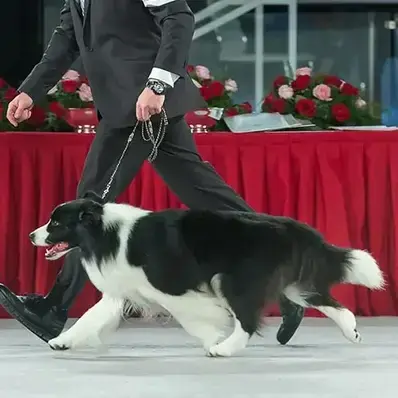Border Collie History/Origin
The ancestors of the Border Collie have been helping humans in Britain guard and herd sheep since ancient times. In the border region between Scotland and England, herding dogs became invaluable to shepherds, leading to the selective breeding of the best working dogs.
These purebred dogs varied by region and were known as Welsh Sheepdogs, Northern Sheepdogs, Highland Collies, and Scotch Collies. “Collie” comes from Scottish dialect, reflecting their partial Scottish heritage.
In 1860, Scotch sheepdogs were showcased at England’s second dog show. Shortly after, Queen Victoria became an enthusiast of the breed during a visit to Balmoral. R.J. Lloyd Price is credited with starting sheepdog trials; in 1876, he brought 100 wild Welsh sheep to London’s Alexandra Palace for a demonstration.
Border Collie History- Source: AKC.org
Spectators were amazed by the dogs’ responsiveness to hand signals and whistles. Today, the Border Collie is renowned as the premier herding dog, with many enthusiasts advocating for breeding based on working ability rather than appearance. The American Kennel Club recognized the breed under Herding Group on October 1, 1995.
Border Collie in 1995- Source: AKC.org
Border Collie Personality
The Border Collie is a dynamo with an alert, energetic, hardworking, and smart personality. They are highly intelligent and learn quickly, which sometimes makes it challenging to keep them engaged. Border Collies are known for their strong work ethic and dedication, traits that make them excellent herding dogs.
They thrive in environments where they have a job to do and can be actively involved in tasks. Their intelligence and energy levels require regular mental and physical stimulation to satisfy them.
- Temperament
Border Collies thrive on activity and need to be busy. They are not the type of dog to lounge around the house; they prefer to be constantly on the move. This breed was originally bred to herd sheep, and this instinct to work is still very strong. They are highly sensitive to their handler’s cues, from whistles and hand signals to raised eyebrows, making them excellent at following commands.
Their responsiveness and eagerness to please make them exceptional in various canine sports and activities, such as obedience, flyball, agility, and tracking.
- Potential Issues
Border Collies can become bored without enough stimulation, leading to undesirable behaviors like barking, digging, or chasing cars. Their strong herding instincts like any other herding dog breed can become misdirected if they don’t have a proper outlet, causing them to herd children, cars, or other pets.
This breed can also be strong-minded and independent, which might pose a challenge for inexperienced owners. Additionally, Border Collies can become fearful or shy if not properly socialized as puppies. Enrolling them in puppy classes and exposing them to a variety of people, places, and things can help them develop confidence and prevent anxiety or behavioral problems.
Border Collie Physical Appearance
The Border Collie is a medium-sized, muscular dog with a keen and alert expression, famously known for its intense stare. They have a wide, flat skull, and their strong muzzle matches the length of their skull. Their medium-sized ears are set apart and can be carried either erect or semi-erect, with the tips folding forward when semi-erect.
- Size
Males are typically 19 to 22 inches tall and weigh between 35 and 45 pounds. Females usually stand 18 to 21 inches tall and weigh between 30 and 40 pounds.
- Coat color
The breed comes in two coat types: rough, which is longer, and smooth, which is shorter, both featuring soft, double coats. Border Collies have a wide range of coat colors, including black, white, blue, blue merle, red merle, brindle, liver, sable merle, and red. Their fur can be solid, bicolor, tricolor, or merle, with the most common color pattern being a combination of black and white.
Border Collie Gender Differences
Personality differences in Border Collies are generally minor, females tend to be a bit calmer and more focused on training than males. Females are also slightly smaller and lighter standing, compared to males. However, individual behavior largely depends on the quality of training and upbringing rather than gender.
Border Collie Feed/Nutrition
The amount of food your adult Border Collie needs depends on various factors, including size, age, build, metabolism, and activity level. Dogs are individuals, just like people, and their food requirements can vary significantly. Generally, 1.5 to 2 cups of high-quality dry food per day, divided into two meals, is recommended.
Naturally, a highly active dog will require more food than one that is more sedentary. The quality of dog food also plays a role; higher-quality food provides better nutrition, meaning you’ll need to feed less of it to meet your dog’s needs. Additionally, incorporating cucumbers as an occasional treat can offer a low-calorie, hydrating snack.
Border Collie Health
Border Collies are generally healthy, although, like all breeds, they can be prone to certain health conditions. While not all Border Collies will develop these diseases, it’s important to be aware of them if you’re considering this breed. When purchasing a puppy, it’s advisable to find a reputable breeder who can provide health clearances for both parents.
- Hip Dysplasia: An inherited condition where the thighbone doesn’t fit snugly into the hip joint, potentially leading to pain and lameness. Screening through X-rays is the most reliable diagnostic method. It’s crucial to ensure both parents have tested negative for hip dysplasia.
- Progressive Retinal Atrophy: A group of eye diseases causing gradual retina deterioration. Early signs include night blindness, with vision loss progressing over time. Many dogs adapt well to limited vision in familiar surroundings.
- Epilepsy: A neurological disorder causing seizures, which can vary from mild to severe. Proper veterinary diagnosis is essential to distinguish epilepsy from other causes of seizures.
- Collie Eye Anomaly: An inherited condition affecting the eye’s development, potentially leading to vision impairment or blindness by two years of age. There is currently no treatment available.
- Allergies: Border Collies may develop food, contact, or inhalant allergies, each requiring specific management such as dietary changes, medication, or environmental adjustments.
- Osteochondrosis Dissecans (OCD): An orthopedic condition affecting joint cartilage growth, often observed in elbows or shoulders. It can cause joint stiffness and may be exacerbated by overfeeding or inappropriate diet during puppy growth stages. Early detection is crucial.
Understanding these health concerns can help potential owners make informed decisions and ensure the well-being of their Border Collies through proper care and preventive measures.
Border Collie Care and Grooming
The Border Collie is a low-maintenance breed when it comes to grooming, not requiring excessive fuss to keep him looking his best. His weather-resistant double coat benefits from weekly brushing to distribute natural oils and prevent tangles in the rough-coated variety. During shedding season, more frequent brushing helps minimize loose hair around the home.
Bathe your Border Collie only as necessary, typically every four months or when visibly dirty or odorous. Regular brushing of teeth several times a week reduces tartar buildup and maintains oral health.
Trim nails monthly if needed and inspect ears weekly for dirt or signs of infection, cleaning with a gentle, pH-balanced ear solution. During grooming sessions, also check for any skin abnormalities, and monitor eyes for clarity and absence of discharge. This routine examination aids in the early detection of potential health issues.
Border Collies are extremely active dogs that need plenty of daily exercise to burn off their energy, making them ideal for active households. If you enjoy being outdoors frequently and have safe places for off-lead running, a Collie could be the perfect breed for you.
Additionally, training your dog to stay can help manage their energy and keep them safe during outdoor activities.
Border Collie Rescue Groups
Numerous rescue organizations focus on finding homes for dogs such as the Border Collie. These groups offer essential care, rehabilitation, and adoption services to dogs requiring assistance.
Border Collie Price
The price of a Border Collie typically ranges from $800 to $2,500, depending on factors such as breeder reputation, pedigree, and location.
When purchasing a Border Collie from a breeder, thorough research is essential to ensure they are reputable and ethical. Look for breeders who prioritize health clearances, proper care, and ethical breeding practices.
Interesting Facts
- Border Collie played Fly in the movie “Babe” (1995)
Babe- Source: Wikipedia
- Queen Victoria developed a strong fondness for Border Collies in the early 1860s, becoming an enthusiastic supporter of the breed.
Queen Victoria- Source: Border Wars
- Border Collies participated in the 1960 Collie Club of Georgia show, where they were handled by children.
Border Collies in 1960 -Source: AKC
Best For
Border Collies are best for active individuals who can provide the necessary physical and mental stimulation they require. They thrive with owners committed to training, exercise, and activities that engage their herding instincts and intelligence. Their loyal and affectionate nature makes them ideal companions for those who appreciate their eagerness to work and please their owners.
Top Names
| Male Border Collie Names | Female Border Collie Names |
| Max | Bella |
| Charlie | Lucy |
| Cooper | Molly |
| Buddy | Daisy |
| Toby | Sadie |









 Border Collie History- Source:
Border Collie History- Source:  Border Collie in 1995- Source:
Border Collie in 1995- Source: 

 Brown and White Border Collie – Source:
Brown and White Border Collie – Source:  Black and White Border Collie – Source:
Black and White Border Collie – Source:  Red merle Border Collie – Source:
Red merle Border Collie – Source: 
 Babe- Source:
Babe- Source:  Queen Victoria- Source:
Queen Victoria- Source:  Border Collies in 1960 -Source:
Border Collies in 1960 -Source: 






